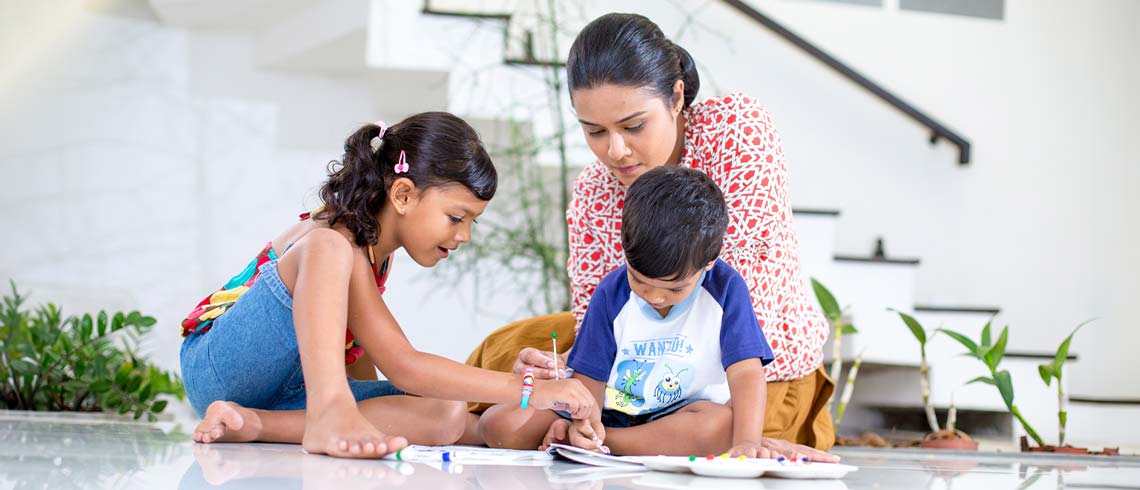























Know More About Your Little Champs’ Brain Development

Nimali Buthpitiya
Children are born with an inner drive to learn. They learn about themselves, others and about the world around them each time you cuddle them, take them for a walk, when they interact with others or engage in play. They learn from anything which they can experience through their five senses, that means our children learn through what they see, hear, feel, smell and taste.
As your child keeps achieving milestones in his or her brain development, you will begin to see that he or she is now able to
• pay attention and respond
• learn language gradually
• memorize things better
• think and processinformation better
• solve simple problems
• understand cause and effect
Why these skills are important for children?
From birth through age five, children develop many neural pathways. This is a period where children experience a remarkable development in their brain than they will at any other period of life. This is when children begin to understand various concepts related to learning and development such as language, pre-reading, vocabulary building, numeracy, object permanence and so on. Healthy brain development also supports continuous progression in physical, language, social and emotional domains of the child. Therefore, as parents, focusing on helping those neural connections develop is vital and children should be supported meaningfully.
How children can be supported at home?
Stimulate your child’s five senses
Use materials that can be found in your home, times during daily chores, simple activities that can be done with your child that gives them the opportunity to engage their five senses.
This can be making a sensory bin with various materials put inside where your child can touch and feel the texture and explore, a cooking time, where your child can smell and taste ingredients or a gardening activity where they can touch soil, explore plants etc. Stimulating senses can help build neural connections in the brain.
Provide opportunities to observe, explore and experiment
Observation, exploration and experimentation arouses your little one’s curiosity, creativity and problem solving skills. They engage in thought processes, ask questions, experiment and find answers, take time to observe. Support them by taking them for nature walks, providing play materials such as blocks, puzzles, Lego and natural ingredients that are not toxic which they can experiment with.
Provide play opportunities as much as possible
Play (both Indoor and outdoor) allow children to use their imagination, problem-solving skills and help develop social skills. Both individual and group play activities are helpful in this. Among many other types of play, pretend play,that involves playing different roles, characters, create stories and scenarios exercise their intellectual capabilities to a greater extent.
So, provide your child with a variety of play materials (dolls, magic wands, garage tools, money etc) and dress-ups that help them engage in this type of play. These items can be improvised rather than buying.
Allow your child to find answers orsolutions
Problem-solving skills are essential for brain development. In order to help your child improve their reasoning, logical thinking and decision-making skills, it is a great idea to allow them to solve simple problems. Providing them with age-appropriate challenges would be the best way to do this and let them figure out how to face those simple challenges and solve them on their own.
Read with your child
While reading together with your child is known as one of the best ways to develop language it promotes cognitive development as well. Reading books provide great opportunities for children to engage in exercising their memory, critical thinking and concentration. While reading sharpens children’s intellectual skills, it also creates a life-long love for reading and learning in the long run.
Limit screen time
If you want your little champ to experience a healthy brain development, excessive screen time can be a huge road block for that. Since excessive screen viewing can lead to language delays, lower levels of attention span and poor social skills, the best way to reduce this time is to set aside time where you encourage your child to engage in other interesting activities where they actively play, read, listen to music or do anything freely chosen by themselves.
Encourage healthy habits
Healthy habits are anotherimportant element of healthy brain development. Consistent sleep schedules that allow adequate sleep, healthy eating habits and a balanced diet, physical exercise, hygiene and other healthy habits promote uninterrupted intellectual growth and a strong foundation for life-long wellbeing. As parents, little ones can be taught, trained and encouraged to adopt these healthy habits from the earliest stage itself.
Tips: Help your child experience a healthy brain development.
• Stimulate your child’s five senses
• Provide opportunities to observe, explore and experiment
• Provide play opportunities as much as possible
• Allow your child to find answers or solutions
• Read with your child
• Limit screen time
• Encourage healthy habits
Share With:
Recommended Articles


Nimali Buthpitiya
Support your Child’s Language Development during First Five Years!
Language skills during the early years and the next years of a child’s life play a crucial role. It helps them understand what is happening around them, communi...
Read More

Dinusha Manjarie Wickremesekera
Importance of Play
“Play is not a luxury. Play is a necessity.” Kay Redfield Jamison Development Psychologist, David Elkind states that there are three requi...
Read More

Dinusha Manjarie Wickremesekera
Early Education and Cognitive Development
Cognition refers to our ability to think and reason. Development implies that it is a continuous process and cognitive development is lifelong. We...
Read More